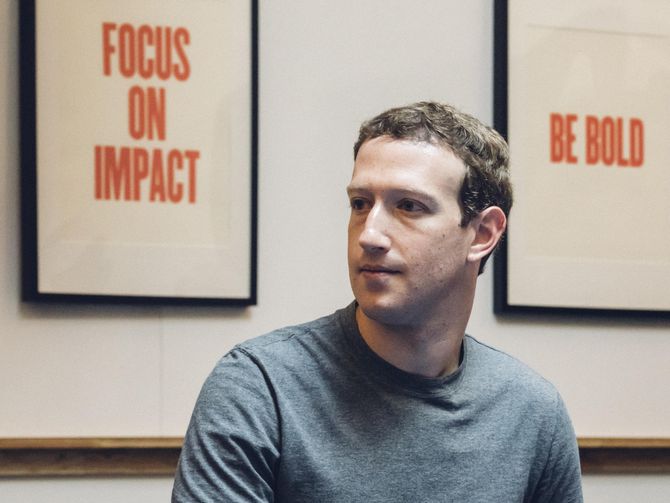[ad_1] Zuckerberg will be apologizing a lot to Congress this week. James Martin/CNET Mark Zuckerberg is on Capitol Hill to deliver one of the most high-profile mea culpas in tech history. The 33-year-old multibillionaire is testifying before a joint hearing of the Senate Judiciary Committee and Senate Commerce Committee on Tuesday and then talking to the House Energy and Commerce […]
[ad_1]
Zuckerberg will be apologizing a lot to Congress this week.
James Martin/CNET
Mark Zuckerberg is on Capitol Hill to deliver one of the most high-profile mea culpas in tech history.
The 33-year-old multibillionaire is testifying before a joint hearing of the Senate Judiciary Committee and Senate Commerce Committee on Tuesday and then talking to the House Energy and Commerce Committee on Wednesday.
His task: to answer questions about the biggest scandal to hit Facebook since it was founded 14 years ago and to reassure lawmakers, investors, advertisers and 2.2 billion users that Facebook can be trusted with their data.
“My top priority has always been our social mission of connecting people, building community and bringing the world closer together,” Zuckerberg said in prepared remarks released Monday ahead of Wednesday’s House committee meeting. “Advertisers and developers will never take priority over that as long as I’m running Facebook.”
Zuckerberg has a lot of convincing to do. In March, Facebook was forced to acknowledge that data about millions of users was shared without their permission. That admission came only after a whistleblower gave the details to The New York Times and The Guardian’s Observer, which revealed that University of Cambridge lecturer Aleksandr Kogan had created an app several years ago that could collect profile, location and friends data for hundreds of thousands of people by promising a personality quiz in exchange.
Through those people, he was able to collect friends information from as many as 87 million people’s profiles, Facebook said. Kogan then reportedly passed along all that info to a UK-based political data analytics firm called Cambridge Analytics.
Facebook found out about the episode and in 2015 asked Kogan and Cambridge Analytica to sign documents promising the data had been destroyed. It didn’t publicly disclose any of this until a day before the news stories about the arrangement were published.
The news that Facebook lost control of its users’ data, and that it said nothing publicly in the years since, has raised a fundamental question of trust in the world’s largest social network. Facebook is a free service that makes its money — more than $40 billion in sales in 2017 — by capitalizing on the details and information that its users share.
Some advertisers have already ditched Facebook, users have started a campaign called #DeleteFacebook on Twitter and prominent tech executives — including Tesla CEO Elon Musk and Apple CEO Tim Cook — have berated the company. Musk, who deleted Tesla and SpaceX pages from Facebook, said the social network gave him “the willies.”
“It’s clear now that we didn’t do enough to prevent these tools from being used for harm,” Zuckerberg said in his prepared testimony. “That goes for fake news, foreign interference in elections and hate speech, as well as developers and data privacy. We didn’t take a broad enough view of our responsibility, and that was a big mistake.”
Interest in Zuckerberg’s testimony has only been exacerbated by the company’s mishandling of the scandal. Facebook put out a statement late on a Friday before the initial stories were published, then Zuckerberg remained silent for days before finally agreeing to a few interviews. In those interviews, he began the line he’s followed since: He’s sorry, Facebook screwed up, and they’re going to fix this.
Into the lion’s den
Zuckerberg has two jobs while appearing at this week’s hearings. His first is to apologize — believably — according to public relations and policy experts. The second is reassure the lawmakers he’s answering to, who will likely use the event to grandstand against the California-based CEO.
“With all of the data exchanged over Facebook and other platforms, users deserve to know how their information is shared and secured,” Chuck Grassley, the Republican chairman of the US Senate’s Committee on the Judiciary, said in a statement last week.
Not everyone’s convinced Zuckerberg will succeed. Saturday Night Live skewered him over the weekend, with an impression of Zuckerberg as being unwilling to delete people’s data (“You gave it to me. No backsies,” parody-Zuckerberg said) and uncaring about the magnitude of the scandal around him. “Sure, maybe Facebook sold out our democracy to Russian troll farms. My bad?” SNL’s faux Zuckerberg said with a snarky shrug.
Meanwhile, the real Zuckerberg has promised to fix networks’ issues around “privacy, safety and democracy.” In response to the scandal, Facebook has reset its advertising and data policies. For example, it’s its stopped working with third-party data providers like Acxiom and Experian to help marketers target ads at Facebook users. It’s also booted other data analysis firms, including AggregateIQ and CubeYou, that have been accused of misusing data.
The social network is also limiting the data it will share with outside developers. Facebook is going to approve all apps that request access to information such as check-ins, likes, photos, posts, videos, events and groups.
Facebook’s “Login” feature for easily signing up to use apps, which Kogan’s app used to collect the data he allegedly passed onto Cambridge Analytica, will also be further locked down. As of last week, software developers won’t be able to ask for personal information, such as religious affiliation, political views, relationship status, education and work history.
Facebook also said last week it’s disabling a feature that allowed you to search for other users’ profiles by typing phone numbers and email addresses into the social network’s search box. Facebook said that left users vulnerable to having their public profiles “scraped,” or collected, by bad actors. The company also put more limits on what information developers could gather from a handful of Facebook services, including its Events, Groups and Pages features. For example, apps will no longer get to see the guest list for an Event page, or the member list for a Group page.
If all that is supposed to restore users’ confidence in Facebook, it doesn’t seem to be working. In a poll by CBS News (a corporate sibling of CNET), respondents largely said that the company’s response to the scandal has been unacceptable and that they also seriously doubt Facebook can protect them in future.
In his testimony, Zuckerberg said that even if foreign actors or third-party developers misbehave, the buck stops with him. “I started Facebook, I run it, and I’m responsible for what happens here,” he said. “It will take some time to work through all of the changes we need to make, but I’m committed to getting it right.”
Originally published April 10 at 5:00 a.m. PT.
Updated at 7:09 a.m. PT: Added information about a poll of Americans on Facebook’s handing of user data.
Cambridge Analytica: Everything you need to know about Facebook’s data mining scandal.
iHate: CNET looks at how intolerance is taking over the internet.
[ad_2]
Source link















Monday, 13 May , 2024